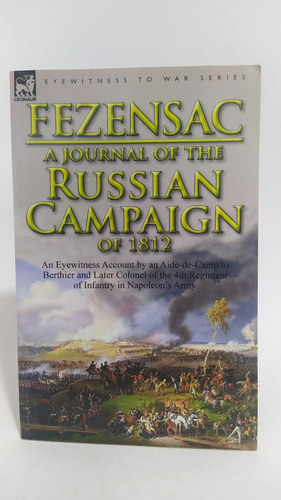A Journal Of The Russian Campaign Of 1812 / Napoleónica
en 6x sin interés
Llega entre el miércoles y el viernes
Retira a partir del miércoles en servicios de encomiendas y otros puntos
Ver en el mapa¡Última disponible!
Conoce la


Características principales
Título del libro | A journal of the Russian Campaign of 1812 |
|---|---|
Autor | Fezensac |
Idioma | Inglés |
Editorial del libro | Leonaur |
Edición del libro | 2011 |
Tapa del libro | Blanda |
Con índice | Sí |
Año de publicación | 2011 |
Otras características
Cantidad de páginas: 120
Altura: 22 cm
Ancho: 14 cm
Género del libro: Historia,Guerras Napoleónicas,Historia de Europa
Tipo de narración: Historia
Edad mínima recomendada: 18 años
Edad máxima recomendada: 88 años
Cantidad de libros por set: 1
ISBN: 9780857066664
Descripción
A journal of the Russian Campaign
of 1812
Fezensac
Eyewitness to war series
Leonaur
2011
An essential first hand account of a French officer of the First Empire
Napoleon, at the height of his unstoppable hubris, attacked Russia and marched his Grande Armee thousands of miles towards its capital, fighting the costly Battle of Borodino before achieving his ambition, only to find it nothing but a hollow and barren victory. Moscow was deliberately set ablaze and the Russians, well aware of the huge strategic advantage the massive size of their homeland was, adopted a scorched earth policy, retreated and waited for their greatest ally-winter-to join the fray. Napoleon's position was untenable, and so began the slow, agonising nightmare of the retreat which would only be completed by a small number of those who had marched eastwards. In the account of Sergeant Bourgogne (also available as a Leonaur edition) we have a brilliant and graphic account of that terrible time recounted by one who experienced it. In fact, it would be fair to say that Bourgogne's has became 'the' account of the retreat, but it is not the only one. This first hand account by Raymond Fezensac also takes the reader through those events in the most memorable way. Fezensac began the campaign as an aide de camp, but as able officers fell, he was required to take up the command of the 4th Regiment of Infantry of the Line as its Colonel. It was clearly a post he relished and his descriptions of his men and the manner in which he led them through action after action speak of his pride, affection and courage. The march of the 4th soon became one of survival and Fezensac worked tirelessly to meet every challenge-the pursuing Russians, the weather, starvation and fatigue-to bring as many of them home as possible. In the end it was to be, of course, pitifully few of them, but this book nonetheless remains an incredible inspirational account of endeavour under adversity. This book has previously appeared under this title in English appended to a substantial work of history of the campaign written by W. Knollys-clearly a work of distinct parts, but one where the history overshadowed the first hand account. By publishing Fezensac's words in their own right we trust will bring them the focus they properly warrant.
Leonaur editions are newly typeset and are not facsimiles; each title is available in softcover and hardback with dustjacket.
